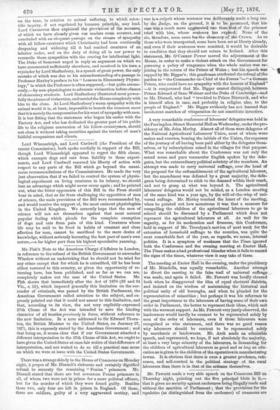A very remarkable conference of labourers' delegates was held in
the Farrin gdo n- Stre et Memorial Hall on Wednesday, under the pre- sidency of Mr. John Morley. Almost all of them were delegates of the National Agricultural Labourers' Union, most of whom wore sashes and rosettes, bearing the initials of the Union, the expenses of the journey of all having been paid either by the delegates them- selves, or by subscriptions raised in the villages for that purpose. What was remarkable about the Conference was not only the sound sense and pure vernacular English spoken by the dele- gates, but the extraordinary political sobriety of the members. An attempt was made to carry universal suffrage, over the head of the proposal for the enfranchisement of the agricultural labourer, but the amendment was defeated by a great majority, the dele- gates being determined to stick to the demand within their reach, and not to grasp at what was beyond it. The agricultural labourers' delegates would not be misled, as a London meeting of the same kind was a year ago, by the will-of-the-wisp of uni- versal suffrage. Mr. Morley touched the heart of the meeting, when he pointed out how monstrous it was that a measure for compelling the children of the agricultural labourers to go to school should be discussed by a Parliament which does not represent the agricultural labourers at all. As well for its sagacity, as for its moderation and firmness, this Conference,. held in support of Mr. Trevelyan's motion of next week for the extension of household suffrage to the counties, was quite the " most remarkable fact of the year, as regards, we mean, internal politics. It is a symptom of weakness that the Times ignored both the Conference and the evening meeting at Exeter Hall. The Tifijelt makes abed professional blunder when it fails to record the signs of the times, whatever view it may take of them.






























 Previous page
Previous page